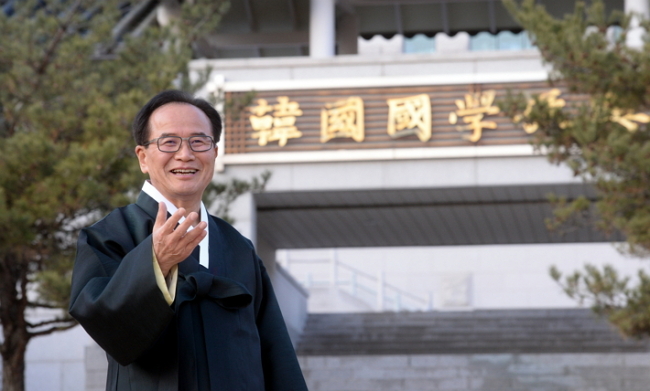[Herald Interview] Making sense of Confucian printing woodblocks
Chief of Advanced Center for Korean Studies touts Confucianism’s value in modern society
By Korea HeraldPublished : Dec. 14, 2014 - 22:35
ANDONG, North Gyeongsang Province ― Despite their historical and cultural value, Confucian printing woodblocks are barely studied. Most people don’t even know they exist.
That’s why Lee Yong-doo and his researchers at the Advanced Center for Korean Studies can’t slow down after the 10-plus-year campaign to salvage the relics from the threat of theft and damage.
Deciphering the wisdom of Joseon scholars carved onto the slabs and making them readily available for today’s guidance-seeking Koreans is a task greater than preservation, said Lee, who is president of the Andong-based think tank.
“The ACKS, for the past two decades, focused mainly on collecting privately-held historical documents and other materials from the Joseon Dynasty,” he said during an interview with The Korea Herald last week.
What lies ahead is the real task of facilitating and leading studies on them, he said.
Established in 1995 under the auspices of the provincial government, the ACKS boasts a collection of over 400,000 items on Confucianism, the guiding philosophy of Korea’s last dynasty, Joseon (1392-1910).
Among them are over 64,000 hand-carved wooden plates used for the printing of some 700 titles. They are housed at a state-of-the-art storage facility in Andong.
Collectively named Confucian printing woodblocks, the precious timbers are up for deliberation for inclusion in the UNESCO Memory of the World Register. A decision is expected in June 2015.
Lee believes that the nomination itself is proof of the relics’ exceptional and universal value, although he pins high hopes on the fancy title.
An UNESCO nod, if realized, would help induce public and academic interest in the woodblocks and hopefully prompt Koreans to look anew at the thoughts, values and ways of life of Joseon scholars, he hoped.
“Most Koreans know about, and many feel proud of, ‘Palman Daejanggyeong,’” Lee said, referring to a Buddhist scripture carved on some 80,000 woodblocks, known in English as the Tripitaka Koreana. The Buddhist canon, created almost 800 years ago, was added to the Memory of the World Register in 2007.
That’s why Lee Yong-doo and his researchers at the Advanced Center for Korean Studies can’t slow down after the 10-plus-year campaign to salvage the relics from the threat of theft and damage.
Deciphering the wisdom of Joseon scholars carved onto the slabs and making them readily available for today’s guidance-seeking Koreans is a task greater than preservation, said Lee, who is president of the Andong-based think tank.
“The ACKS, for the past two decades, focused mainly on collecting privately-held historical documents and other materials from the Joseon Dynasty,” he said during an interview with The Korea Herald last week.
What lies ahead is the real task of facilitating and leading studies on them, he said.
Established in 1995 under the auspices of the provincial government, the ACKS boasts a collection of over 400,000 items on Confucianism, the guiding philosophy of Korea’s last dynasty, Joseon (1392-1910).
Among them are over 64,000 hand-carved wooden plates used for the printing of some 700 titles. They are housed at a state-of-the-art storage facility in Andong.
Collectively named Confucian printing woodblocks, the precious timbers are up for deliberation for inclusion in the UNESCO Memory of the World Register. A decision is expected in June 2015.
Lee believes that the nomination itself is proof of the relics’ exceptional and universal value, although he pins high hopes on the fancy title.
An UNESCO nod, if realized, would help induce public and academic interest in the woodblocks and hopefully prompt Koreans to look anew at the thoughts, values and ways of life of Joseon scholars, he hoped.
“Most Koreans know about, and many feel proud of, ‘Palman Daejanggyeong,’” Lee said, referring to a Buddhist scripture carved on some 80,000 woodblocks, known in English as the Tripitaka Koreana. The Buddhist canon, created almost 800 years ago, was added to the Memory of the World Register in 2007.

The ACKS collection deserves no less admiration and attention compared to the Buddhist woodblocks, Lee believes.
“If ‘Palman Daejanggyeong’ is Buddha’s teaching engraved on timber, Confucian printing woodblocks contain the enlightenment of Joseon scholars who studied and practiced Confucianism in their everyday life,” he said.
Crossing hundreds of years of time, the dead scholars may still offer valuable lessons to modern-day Koreans, he stressed.
“Confucianism was essentially about how human beings can live humanely. I think that question still is a good starting point in this increasingly-complicated society.”
Lee, who took office at the ACKS in September this year, hails from a technological background, which is unusual for someone heading an institution dedicated to traditional studies.
“Tradition can get a new life when it meets the latest technology,” he said, vowing to bring in a fresh perspective to the institution’s mission and functions.
He said he wants to modernize and popularize Confucianism to expand its reach in modern Korea.
In that vein, the leader eyes establishing digital archives of its collection and facilitating Confucian studies by scholars in other fields such as history, literature and philosophy.
Regarding woodblocks, he aims to cement and expand the ACKS’ lead both at home and abroad.
In May, 2015, it will host the fifth annual conference on woodblock preservation and studies, which scholars from four Asian nations ― China, Japan, Vietnam and Korea ― are expected to attend.
The forum is expected to pave the way for the launch of an international organization on woodblock preservation and studies envisioned by the ACKS.
By Lee Sun-young (milaya@heraldcorp.com)
-
Articles by Korea Herald




![[Herald Interview] 'Amid aging population, Korea to invite more young professionals from overseas'](http://res.heraldm.com/phpwas/restmb_idxmake.php?idx=644&simg=/content/image/2024/04/24/20240424050844_0.jpg&u=20240424200058)













![[KH Explains] Korean shipbuilding stocks rally: Real growth or bubble?](http://res.heraldm.com/phpwas/restmb_idxmake.php?idx=652&simg=/content/image/2024/04/25/20240425050656_0.jpg&u=)

